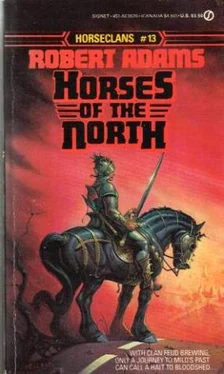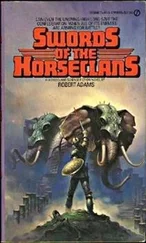Gy Linsee had again taken up his harp. He still sang of the plains and prairies, but this was a different song. The tune was soft and haunting, and it took Milo a while to recall where he last had heard it and what it then had been—a love song from far off Mexico.
“Oh, my lovely plains, you are my mother and my father,” went Gy Linsee’s song, rising above the sounds of water chuckling over the rocks of the streambed, the callings of the nightbirds and the soft whickerings of the horses grazing on the grassy bank above the camp.
“Kissed each day by Sacred Sun, endlessly caressed by your lover, Wind; the grasses in which you lie clad are as sweet to smell as summer honey, oh, my plains …”
The boy sang with his head thrown back, his eyes closed, his face mirroring the rapture and love that his fine voice projected. Simultaneously, his powerful mindspeak also cast out a soothing broadbeam sending which reached every man, boy, girl and cat to a greater or lesser degree.
Milo Morai, seated nearby and carving a new stirrup from a chunk of the seasoned wood, remarked, “That boy has the true gift, you know—his fine voice and his abilities with that harp are only parts of it.”
Hwahltuh Linsee smiled and nodded, looking up from honing the blade of his wolf spear. “Our Gy sings and plays songs mostly of his own composition, Uncle Milo, but he never forgets one of them, either. His voice and his harping are even now every bit as good as his sire’s—which is why I am certain that my brother the chief will insist that Gy, rather than his elder brother, Rik, be named as heir to the office of tribal bard. Poor Rik, alas, could not carry a tune in a wooden bucket.”
He sighed and shook his head sadly, adding, “And then the sparks will surely fly, fly for fair. For Bard Djimi is a man of exceeding strong will, and he truly dotes on his son, Rik.”
Tchuk Skaht’s brows rose upward, further crinkling a forehead already lined and scarred. Slowly, incredulously, he spoke.
“But, man, the matter be simple, on the face of it: the one son is far better qualified for office than the other, their ages or the precedent of birth be damned. And yet you seem to feel that your bard would openly defy his chief? Why, a bard is the third most powerful subchief in a clan, subordinate only to the chief himself, and the tanist.”
Hwahltuh shook his head. “Not so in Clan Linsee, Hunt Chief. We have no tanist, practicing as we do descent through the father rather than the mother. Our next chief will be the eldest son of my brother still living, whole of body and sound of mind … and approved by the council of warriors, at the time of my brother’s demise.”
Tchuk snorted derisively. “What a stupid way to pass on a chieftaincy! And I had thought that only Dirtmen and other such dim-witted, non-Kindred folk practiced primogeniture.”
Milo’s fingers ceased to move, and he gritted his teeth in anticipation of an explosive, probably extremely insulting retort and a probable repetition of the near-bloodletting of earlier this evening. But it did not occur, none of it; apparently, Gy Linsee’s lulling broadbeam had done its purpose well, for although Subchief Hwahltuh frowned and his lips thinned a bit, he continued tightening the wetted sinews about the haft of his wolf spear. When they were to his satisfaction, he set the weapon aside, shrugged and bespoke the hunt chief.
“Some Kindred clans practice descent the one way, some the other way … as you should well know. Nowhere in the Couplets of the Law is any one method for choosing a new chief spelled out.”
“But what,” demanded Tchuk, “if all of your chief’s sons die or be crippled before he himself goes to Wind, eh? What then?”
Hwahltuh again shrugged. “In so unlikely an event, Hunt Chief, I or my eldest son would be chosen chief … unless one of the chief’s sons had left a son old enough to lead the clan in war. Simple, eh?”
“Simple, right enough!” Tchuk’s voice dripped scorn. “Only a simple-minded folk could devise so silly a scheme.”
Milo’s telepathy ferreted out the first stirrings of angry indignation bubbling just below the surface of Hwahltuh Linsee’s consciousness, and he decided to put an end to this dangerous discourse before it provoked what otherwise it inevitably must between the hot-blooded pair.
Starting up work again on the stirrup-to-be, he remarked in a deliberately casual tone, “And yet, Tchuk, although the practice is slowly spreading, still only some score or so of our Kindred clans reckon descent through the maternal line and so pass the chieftaincy to the son of the former chief’s eldest sister. And it is perhaps most fitting that you, Tchuk Skaht, should hold and defend the practice, since it was your very forebears who first brought it among the clans of the Kindred.”
Hwahltuh Linsee snapped up this bit of information avidly, crowing, “Then it was true, what my sire used to say, it was all true! These Skahts truly are not come of the true Kindred, are not of the seed of the Sacred Ancestors at all!”
Tchuk Skaht growled wordlessly and tensed, his right hand pawing behind him in search of the hilt of the saber that now lay across his saddle and bedroll.
The soothing broadbeam of Milo Morai was far and away more powerful than that of the still-singing Gy Linsee; moreover, all of it was directed squarely into the minds of the two would-be antagonists, below conscious level. Still in his calm, casual voice, he spoke aloud, saying, “Be you not so full with pride and that arrogance of your supposed lineage, Hwahltuh, for neither were you Linsees of the Kindred in the beginning. Both the Linsees and the Skahts did not join the tribe until long years after the Sacred Ancestors and their children came down to the prairies. I’ll tell you just how it happened …”
Young Karee Skaht, whose mindspeak abilities chanced to be better than those of many of her fellow clansfolk, dragged the glue pot well back from the fire and stood up, wiping her hands on the legs of her baggy breeches. To Rahjuh’s questioning look, she answered, “Crooktail mindspoke that Uncle Milo is about to recount a tale of long ago, of the early years of the Kindred. I would hear this tale myself.”
Colonel Ian Lindsay appeared a good ten years older than his actual fifty-three years. Not stooped with age, mind you—six foot four in his stocking feet, with a deep chest, wide, thick shoulders, arm and leg bones well sheathed in rolling muscles and still capable of splitting a man from shoulder to waist with that well-honed broadsword that had been his great-grandfather’s pride—but his craggy face become a collection of permanent lines and wrinkles, his once-black hair now a thick shock of snow-white and even his flaring mustaches and bushy eyebrows now thickly stippled with gray hairs.
He was a man beset with problems, problems of such nature as to seem often insoluble to his orderly mind, but somehow he and his staff and the civilian intendant and his staff always came up with some ploy or some substitute for something no longer in supply that would work after a fashion.
Still, as he sat worrying and figuring in his office within the fort designed by his grandfather and built by the battalion of that day with tools and materials that had ceased to be available fifty years ago, he frequently wished that he might have lived in Granddad Ian’s day when things had been so easy—motorized vehicles, vast stocks of petrol to run them and the electrical generators, other huge, underground tanks of diesel fuel and heating oil, thousands of rounds of ammunition for the rifles, pistols, automatic weapons and mortars, fine, powerful explosives of many differing varieties. Then, too, in that earlier Ian’s time, there were almost double the number of people hereabouts, with the battalion at well over full strength. In that halcyon era, the “(Reinforced)” suffix to the unit designation still had real meaning.
Читать дальше












